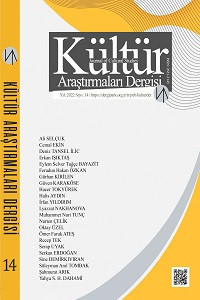Androidler Elektrikli Koyun Düşler mi? Romanında İnsan, Robot ve Hayvan Hakları
Bilim kurgu, yaşam değeri, insan hakları, hayvan hakları, robot hakları
Human, Robot, and Animal Rights in Do Androids Dream of Electric Sheep?
Science fiction, worth of life, human rights, animal rights, robot rights,
___
- Ayala, Francisco J. (2010). “The Difference of Being Human: Morality”. PNAS, 107(2): 9015-9022.
- Bryson, Joanna J. (2010). “Robots Should Be Slaves”. Close Engagements with Artificial Companions. Ed. Yorick Wilks. Amsterdam: John Benjamin Publishing, 63-74.
- Dick, Philip K. (1968). Do Androids Dream of Electric Sheep? London: Orion Books.
- Duignan, Brian (ed.) (2011). The History of Western Ethics. New York: Britannica Publishing.
- Galvan, Jill (1997). “Entering the Posthuman Collective in Philip K. Dick’s Do Androids Dream of Electric Sheep?”. Science Fiction Studies, 24(3): 413-429.
- Gunkel, David J. (2012). The Machine Question: Critical Perspectives on AI, Robots, and Ethics. Cambridge: The MIT Press.
- Güzel, Firuze (2021). Postmodern Perception of Values, Morals and Ethics in Contemporary American Science-Fiction Novel. PhD Dissertation. Izmir: Ege University Social Sciences Institute.
- Huntington, John (1988). “Philip K. Dick: Authenticity and Insincerity”. Science Fiction Studies, 15(2): 152-160.
- Kahn, Peter H., et.al. (2007). “What is a Human? Toward Psychological Benchmarks in the Field of Human–Robot Interaction”. Interaction Studies, 8(3): 363-390.
- Karadaş, Fırat (2021). “Enlightenment Ideology Awry in Philip K. Dick’s Do Androids Dream of Electric Sheep?”. JAST, 55: 45-162.
- Kevles, Daniel J. (1999). “Eugenics and Human Rights”. BMJ, 319: 435-438.
- Singer, Peter (2011). Practical Ethics. Cambridge: Cambridge University Press.
- URL-1: www.britannica.com/topic/speciesism (Accessed 28.04.2022).
- URL-2: https://adata.org/learn-about-ada (Accessed 25.04.2022).
- van Wynsberghe, Aimee & Robbins, Scott (2019). “Critiquing the Reasons for Making Artificial Moral Agents”. Science and Engineering Ethics, 25: 719–735.
- Vint, Sherryl (2007). “Speciesism and Species Being in Do Androids Dream of Electric Sheep?”. Mosaic: An Interdisciplinary Critical Journal, 40(1): 111-126.
- Warren, Mary Anne (1973). “On the Moral and Legal Status of Abortion”. The Monist, 57(1): 43-61.
- ISSN: 2651-3145
- Yayın Aralığı: Yılda 4 Sayı
- Başlangıç: 2018
- Yayıncı: Mehmet Ali YOLCU
Antik Yunan ve Rönesans’ın Tarihsel Sürecinde Heykel Sanatında Çıplaklık
Türkiye'de Medya Okuryazarlığının Dini Boyutu: Sosyo-Psikolojik Bir Değerlendirme
Ceren Zeliha ONAY, Levent KIYLIOĞLU
Çobanlık ve Hayvancılıkta İnsansız Hava Aracı Kullanımı ile Dijital Dönüşüm: Eskişehir Örneği
Asli BÜYÜKOKUTAN TÖRET, Zülal SÖĞÜT
Kırgız Halk Kültüründe Saç ve Saçla İlgili Uygulamalar, İnanışlar
Kimlik Arayışındaki Modern İnsan: Şövalyeler Birliğinden Mr Stone
Kültürel Bellek-Edebiyat İlişkisi Çerçevesinde İskele Gazinosu İsimli Esere Bir Bakış
Türk Basınında Göçmen, Sığınmacı ve Mülteci Haberleri Üzerine Bir İnceleme
Âşık Mustafa Kurbanoğlu'nun Aşk Şiirlerinin Kavramsal Metafor Teorisi Işığında Değerlendirilmesi
Barış DEMİRKAYA, Halil İbrahim GEMİCİ
Örtmece Sözlere Bir Örnek Olarak Tuvalet Sözcüğünün Değerlendirilmesi
